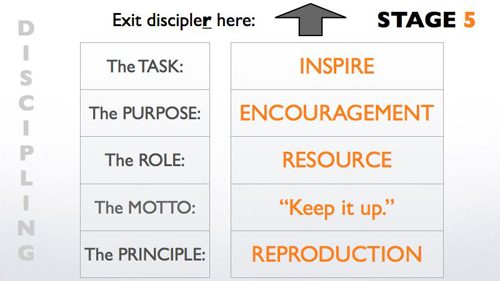Stage Five - Inspire
Series | Making Disciples
This is the final stage in the practical discipleship plan of attack. In Stage Five the disciple exits the process as a discipler.

The disciple has been taught. He’s watched how it’s done. He’s rolled up his sleeves in the work of the ministry alongside his discipler. He’s received constructive criticism to help him get better. By now the bulk of his training is complete and he’s ready to be on his own. So the fifth TASK of the disciple-maker is to inspire. This is probably my least favorite word, but it fits (for more than just alliteration). The PURPOSE is encouragement. Making disciples is hard work. Difficulties and heart heaviness are regular occurrences. Sometimes disciples need a shot in the arm.
The ROLE of the discipler becomes that of a resource. The need for constant interaction diminishes, but the disciple turned discipler may run into something he hasn’t encountered before. Maybe an unusual circumstance or knotty theological question surfaces. Maybe he needs seasoned counsel, wisdom from experience, or just someone to pray for him. But he has access to advice whenever he asks. Therefore the discipler utilizes the MOTTO of “Keep it up.” and is always available for assistance.
The PRINCIPLE is spiritual reproduction, much like the proper goal of parenting. Good parenting isn’t about providing or doing everything for the children. It aims to train kids how to be adults; how to accept and fulfill responsibilities. That doesn’t happen if dad always builds the Soap Box Derby car or never lets his son make a decision. Mom hinders growth by always being the one to braid her daughter’s hair or by constantly defending her. Yes, kids need more care at the beginning and it may be a slow train to maturity. But parents find out whether they were successful when their young person leaves the house, not by them living at home forever. Even then, however, they provide a different kind of attention when the kids are grown and have families of their own. So a discipler knows he’s succeeded when he sees and serves spiritual grandchildren.
Jesus was gone when the disciples took the gospel from Jerusalem to Judea to Samaria and then to the ends of the earth. He could do that because everyone when he is fully trained will be like his teacher. (Of course, Jesus didn’t leave His disciples without a Helper). When we entrust to faithful men who will be able to teach others also the process continues even when we’re absent.
Our goal is to see every person complete in Christ. Another way to say it is, we work to see each person independently dependent on Christ. An independent person is one who looks for things that need doing and does them without someone else constantly looking over their shoulder. A mature disciple doesn’t need constant supervision though every disciple remains dependent on Christ. So a discipleship purpose statement might look something like this:
We labor to help every person establish godly habits, motivated by love for Christ, that will cause them to be independently dependent on Christ for the rest of their lives, while helping others do the same.1
The relationship between a disciple and his discipler purposefully changes over time if discipleship is effective. But whether disciples move on to minister near or far, disciplers are always ready resources.
- We don't expect to complete this objective in student ministries, even by the time a senior graduates. But we do aim to equip students as much as possible in the six years we have them and hope they enter the next stage of life more like Christ in character and service than when we got them. ↩